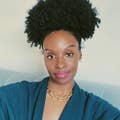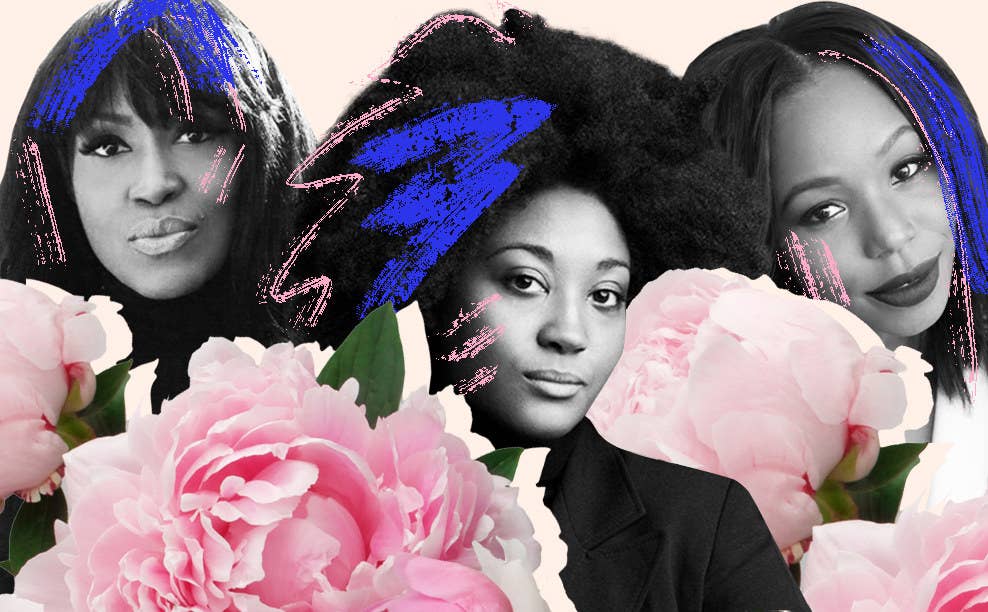
Growing up in Augusta, Georgia, I had no direct connections in my network to black women who'd made it in the industry I so desperately wanted a career in — and knew I belonged in. So I found myself studying, from afar, women I'd never met, googling their interviews and Emmy speeches, and watching their daytime talk shows. When my friends were running home after middle school to catch music video countdown shows, I was RACING to Oprah! And on the first day of biology at my beloved HBCU, Albany State University, I raised my hand to tell Dr. Fort I wouldn't be able to make lab days because the time conflicted with The Tyra Banks Show. Fast-forward to a seven-year career in media, nearly three of those as the beauty editor at BuzzFeed's As/Is, and I still seek out representation with that same desperation. Seeing people who look like me, doing what I want to do, is a constant reminder of what's possible; it's kept me going in times when I was literally about to give up.
I think a lot about the crucial role representation has played in my own career, and because of it, I'm now in a space where I can play a part in making sure other people are represented too. Most recently, I had a very real and honest conversation with TV writer Jas Waters (This Is Us, Kidding); Kahlana Barfield Brown, fashion and beauty editor-at-large for InStyle; and Solange Franklin, an independent fashion stylist and Paper magazine's fashion editor-at-large, about being a black woman in media. I wanted to talk to these three brilliant and successful women in various capacities of media and entertainment to put another resource into the universe, trusting that destiny leads it to the people who need it most.
This Q&A is for all the girls, with the same little to no access that I had, whose minds are bubbling over with all the questions that make you paranoid and anxious when you really want a career in this field: How in the world do I do this? Is what I wanna do even a job? Are my dreams too big? Will straightening my natural hair make it easier? It won't answer every question because some things you just gotta learn through life experience, but at the very least, hopefully it'll provide a moment of insight, like, OK. *deep breath* This is possible. They did it, and I can too.
Growing up, Susan Taylor, former editor-in-chief of Essence, was the first black woman I saw in editorial. Were there any black women who are doing what you do now when you were younger? Did you know your career was a possibility?
Jas Waters: Oprah used to come to my church once a year. She was super cool with my pastor, who was politically connected, and he was also my godfather... And not only getting to see that, but her seeing me. It was a really impactful thing because we all just want to be seen. When The Color Purple happened, it was the very first time I remember looking, sitting in the [theater] row, and my entire family was there. And I could not believe it, and I thought to myself, "Oh, this must be important." The idea that my entire family would gather in the same space to see this showed me firsthand how important telling a story is and also telling our story. And then, of course, the film starts and who's on the screen but Oprah. So I think in many ways, it was her.
In terms of career, when I started getting into high school and discovering the types of stories that I was drawn to, someone who really opened my eyes was Gina Prince-Bythewood. She wrote and directed Love & Basketball, but Gina also came from A Different World, and A Different World changed my life. A Different World made me want to go to college. A Different World taught me so much about blackness and about my own experience, and it formed so much of who I was as a kid. I remember going to see Love & Basketball and thinking, Who is this woman that wrote and directed this?

Kahlana Barfield Brown: Honestly, no. I didn't. When I was at Howard — when I really knew I wanted to get into fashion magazines — the only person that I really remember kind of looking to was André Leon Talley. It wasn't until I actually moved to New York and got an internship that I started to see some of the women. I can count on one hand how many there were. Sydne Bolden was the style director at InStyle when I started, and when I tell you goals on top of goals on top of goals. She was everything to me because when I started there weren't many black women on staff. There were three, and Sydne was one of them. I want to be that example, I want to be able to show that to other black girls. I think one of the great advantages of social media is that people are able to discover you, and people can see through you what the possibilities are.
Solange Franklin: In my adolescence, I certainly did not know styling was a possibility. Meredith Corporation (Better Homes and Gardens, etc.) is located in my hometown of Des Moines so I was actually aware of magazine editors and journalists. But I thought the only path to magazines was via writing, which I enjoyed but didn’t want to pursue as a career. By the time I attended college I was well aware of the titan that is June Ambrose. I had the opportunity to assist her on set while I interned at Essence, and it was a memorable milestone in my career. June is one of the most influential landmark stylists — and I loved that she has a family, seemingly doing it all while giving us seminal looks for everyone from Missy Elliott to Jay-Z. I’m grateful for her visibility.
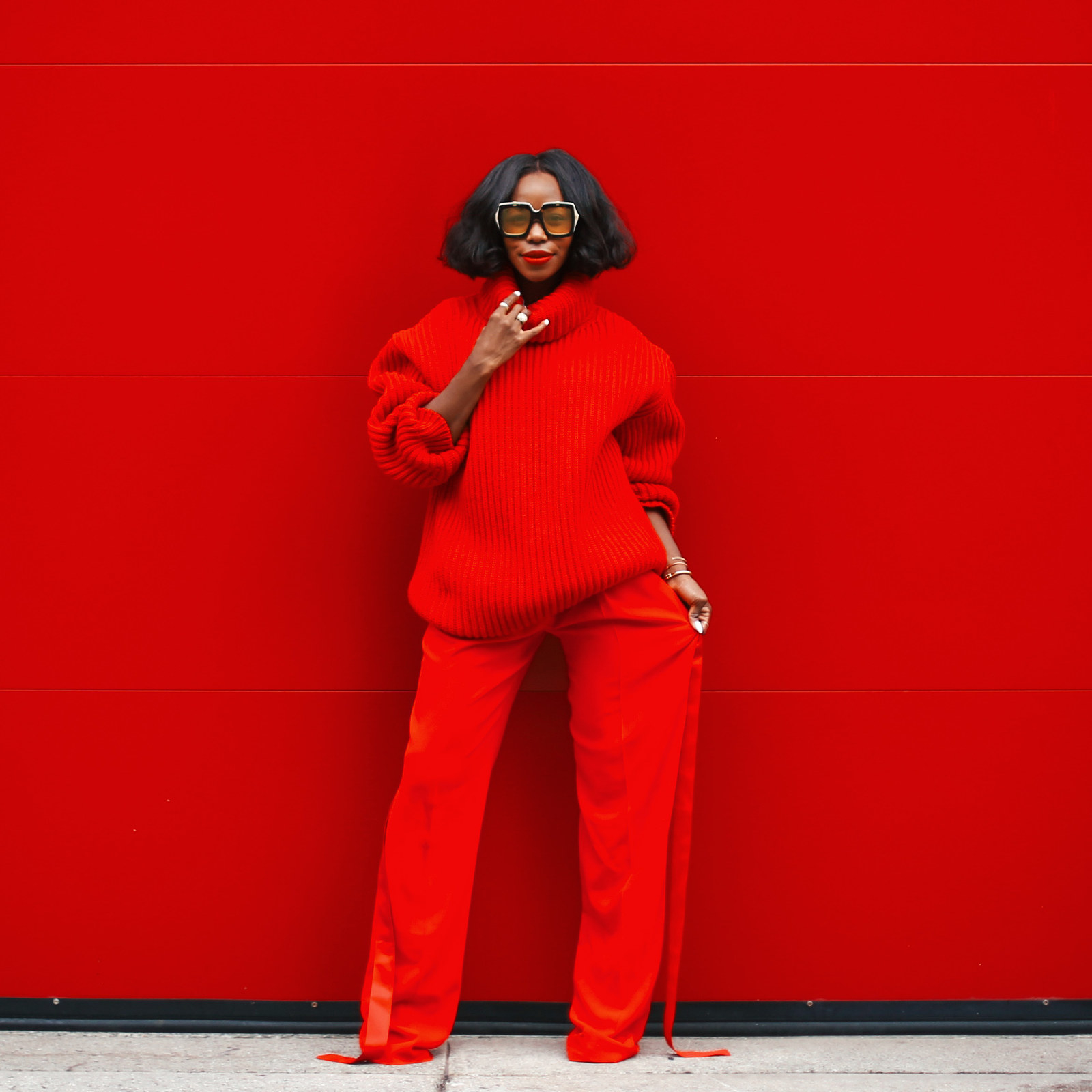
A time I was reminded of my blackness was at a press event. I showed up, as scheduled, and a publicist denied me an interview with the celeb client but permitted other editors, who happened to be white women, to do an interview. The celeb was black, and I think she sensed what was happening because she personally reached out to me and graciously proceeded with the interview. Do you remember a time when you were reminded of your blackness at work?
KBB: We were the first magazine to shoot [a celebrity]. When we found out that she was nominated [for an award], we threw a party ... [and] we had a dinner for her. So we met, she was so nice, and we had such a good time at the dinner. She was like, "Oh my god! I'm so happy to see that you're a black beauty editor!" It was all good. Four weeks later she wins the [award]. She gave this whole beautiful speech; I was in tears — everybody in the whole room was in tears. After that was [a party], and that's where all of the winners go. I'm literally the only black journalist there. Obviously, you know, as journalists our priority is to get quotes from all the winners. So I remember going, and obviously I'm thinking to myself, "Of course, this is going to be easy — she knows me." She came in and everybody was kind of just like drowning her and I wanted to give her space, so I was just like, I'll wait, let all of it die down, and I watched her talk to everybody. So finally I approach her, and I'm like, "I'm Kahlana from InStyle; I'm not sure if you remember me," and she was like, "Yes, I remember you." And I was like, "Can I ask you a few questions?" And she was like, "No." And literally rolled her eyes and turned her back to me.
I have never been so hurt in my career. And I wasn't hurt because I was being denied; it was being denied by another black woman when I watched [her] talk to every single other white journalist. It was so confusing to me. I remember physically shaking and calling my husband in tears. Your story that you're telling me, it was the opposite because it was coming from my own. I honestly felt at that time that she wasn't talking to me because I was the only other black woman in the room. And I almost feel like it was kind of like she was loving being that one, you know what I mean? That was a lesson to me: You have to always hold your people down. And I'm telling you from that day forward, I don't care where I am, if there's another black woman that wants to talk to me or approach me, I'm going to make time because I think there have been far too many stories like the one you had being the one black journalist and you weren't granted that interview.
SF: My first shoot of the new year was a beauty story. The decision-making team was people of color but not black. Apparently, there was a reference that wasn’t shared with me about cornrows for the model. Upon seeing that the braids being done on a white — or white-presenting — model looked like cornrows, I had to step in and firmly but kindly say, “We can do braids but they cannot look remotely like cornrows.” I was met with incredulity. Then I was met with passive resistance. My vacation glow quickly faded as I realized the fact that I had to a) say anything and b) be met with resistance, which is, of course, par for the course. But I still don’t want to believe it, and I will not stop fighting it. It’s a burden I hope to disperse more among our allies.
What was one of your biggest career failures or regrets? At the time did you think it'd cost you your job?
JW: So I just told this story recently on Charlamagne's podcast. I got fired when I was really young. I worked for Eriq La Salle. I want to just be very clear. I had done something wrong, and he called me to the office to fire me.
[Editor's note: On Charlamagne and Andrew Schulz's podcast The Brilliant Idiots, Waters revealed, "Technically, I'm a convicted felon." She was working as an assistant for Eriq La Salle (Coming to America), making $21,000 a year in LA when her younger sister got pregnant. Jas started using the company credit card to buy things, which totaled $4,000, for her sister's pregnancy. La Salle fired her and pressed charges, alleging that she'd stolen $20,000. Listen to the full story here at around 1:23.]
And he proceeded to tell me something that was true in part. He said that I had just wasted four and a half years of my life; I had erased it. I don't think he meant it maliciously, but he said that my career, essentially, was over. I didn't realize until 2015, 10 years later, how much I believed that.
I wrote my first script when I was 9. I had only worked in entertainment. I had only worked in production and development. This was my dream. And so I genuinely felt, "Oh my god, I have cracked out. What do I do now?" You know, like, how do I find a new dream? And then I ended up finding blogging, which was sort of dream-adjacent. Even though I knew within my heart of hearts that really wasn't it, I was gonna make "it." And I loved my blog. And so as it grew, it was not only creatively satisfying, but it was also just sort of partially validating.
But I also lived under this fear and this stigma of the really stupid choices I had made. And what I didn't see was this entire time as I'm working on the blog, the blog then led to writing freelance — literally interviewing everybody from Warren Buffett to Joan Rivers. I was growing despite my bad choice. In 2013 I did a reality series, and it was really terrifying for me because I was gonna be on TV. And I kept thinking like, Oh my god, what if this guy sees me and he tells everybody, "She did this awful thing," and everyone hates me? But it was fine, and doing that show then led me back to LA and back to writing. And it wasn't until 2015 when I got back here that I was authoring somebody else's autobiography. And when it was over, it had paid me more money, up until that point, than I had ever made professionally in my life. And for the first time as an adult, I was in the black. And I said, “You know what? I'm going on vacation,” and I went to Paris.
My second day there, I went to the Eiffel Tower and I had lunch at 58, which is phenomenal. And then when it was over, I was like, “I want to go to the top.” There was an hour wait for the elevators, and I was like, “Alright, well, fuck it, the stairs are right there.” So here's the thing: The Eiffel Tower really is the Eiffel Tower. There are no sides; there are no walls. It's just metal, so as you get higher, what they don't tell you is it's swaying with the wind — and I'm low-key afraid of heights. So it's swaying, and I'm just like, "Alright, so I'm two-thirds of the way up. It's only gonna get worse if I get higher." And so now I'm considering, do I go back down? I had to stop myself, and I had a by-myself meeting in the Eiffel Tower, which sounds so ridiculous now, but this is exactly how it happened: I sort of pulled over to the side, letting people pass me. I said to myself, "Listen. Did you really come 65 stories up to stop now? Really think about everything you have overcome." Spending that time in jail and having cavity searches — that's not fun. Also, there's this social stigma. Eighty-five percent of the people who I built my life around my first stint in LA stopped talking to me. They stopped talking to me, one, because I couldn't do anything for them. And, two, because they also were like, "You are persona non grata here." I had fucked up and fouled out. And still, it all led to me getting back on my feet enough to be sixtysomething floors up at the Eiffel Tower. And so I climbed. And I got up there, and I'm standing on the observation deck and I'm looking out over France. And it was an opportunity to see my life out of context. I said then and there that this was over. I was done believing that I was my mistakes, that I was a product of my bad choices — and I let it go. I was no longer going to live under the weight of being young and stupid and being entitled, and I would grow from it and learn from it and move on. And that's life. It is not letting the worst about you define you.
Media can be very one-dimensional in its images and narratives. Has being a black woman affected the way you do your job at all?
JW: It's interesting. Being black in film and TV now has gotten slightly more complicated, and actually just being in TV and film now for everybody has gotten significantly more complicated because the world is now aware of how we reinforce stereotypes, and we're learning and we're changing in real time. And there are times when it is not easy. You have to say the things that nobody wants to hear. You may kill a joke; you may kill a whole storyline.

I had a moment on a previous show that was terrifying. When it was over, my hands were shaking. I had to say, "Hey, hey, hey, guys. Black people aren't like that. We don't do that. Or that means something different to us." And it was challenging a showrunner, but coming from a place of, "This is not true to what we actually need to see in the world, because it's just not being used right." You have to really pick your battles, and there are some showrunners that the moment you challenge them, you're gone. I learned something in that moment, not only about myself, but also about the producers who I work for in that they heard me, and they reversed course. As terrifying as that moment was, what it taught me about myself is that above all else, my commitment is to who I am as a person. And who I am as a person is very much a black woman moving in this world.
SF: Being a black woman influences almost every decision I make. I often create for my younger self, hungry for multidimensional imagery of black folk and of all people of color. I still get excited to see POC of varied backgrounds and [get] excited that they inhabit nontraditional spaces.
Including black men and women for casting is the most natural decision I make on a daily basis. Fighting to include larger sizes and challenging classist narratives is also a priority for me. It genuinely feels like a public service since the visual narratives affect the dominant culture as well — it’s important for men to see women in roles in which they’re not subjugated. I want skinny people to appreciate the beauty of curvy people. We all need that injection of subliminal empathy and celebration.
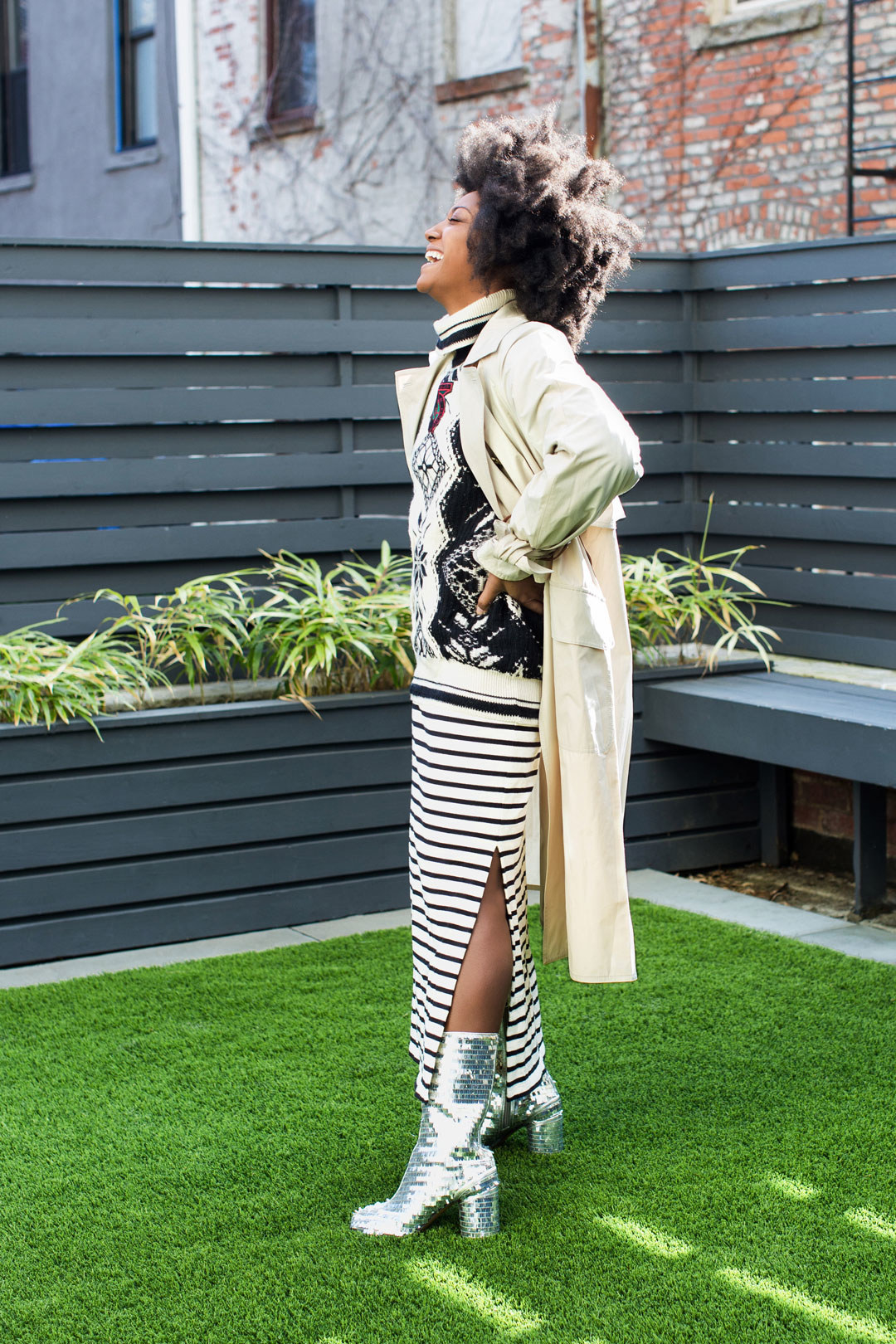
What was one one of your proudest moments and why?
JW: I don't know what it is about Paris, but I literally just came back from Paris. And I go to sleep one night, and it's like 1 o’clock in the morning Paris time, and I get this text from my niece. I have a niece and nephew in Chicago who are 10 and 12, respectively. And it's a video, and I watch it, and my niece and nephew had made a television show about their youngest brother. They shot it; my nephew edited in transitions for commercial breaks. And when I tell you that — I'm, like, about to cry right now — I bawled like a baby. They were so excited. I FaceTimed them, and they were like, "Did you watch it and what did you think?" I then go back to that really small version of me that woke up on Sunday mornings like, "Oprah's coming today! I watch her — she makes me want to do things." And it just made everything worth it; it made all of the hard stuff so much easier. For all the time I've spent completely broke and figuring out how I was gonna pay rent, moving from place to place, it all becomes worth it when you realize that there are these tiny people who are the next generation of your family, who have been watching you this entire time. And they feel like, "Oh, I can do this too." And it was the proudest moment of my life.
KBB: Writing "Pretty for a Dark-Skinned Girl." That was hands down my most proud moment, my most satisfying moment, in my career. Being able to write a story like that for a magazine like InStyle, I felt like, "Okay, my work is done." That story got the most hits on instyle.com for such a long period of time. I think it was a great way to show when you tell our story, people will engage ... and we support, and all we want to do is have a seat at the table — that's it. All we wanna do is be included and be part of the conversation. It was just powerful to see that story for InStyle. You could very much see that story in Essence.
SF: I styled the first homeless Girl Scouts troop for Teen Vogue last year. The founder’s response to the imagery and our time photographing the girls was priceless. She felt that the girls were represented with the beauty and dignity they deserve and that it inspired confidence in them. I was so touched that I became a leader in their troop.
Being a black woman in this space has really given me an opportunity to create stories like this one, and to show other people there's a black girl at BuzzFeed who looks just like you — coily hair and dark skin — who sees you and who is creating stories for you. What do you feel the advantages are of your identity as a black woman in media?
JW: I mean, listen, I'm on Jim Carrey's new show. We get to literally play with Jim Carrey and Michel Gondry every day. And they pay me for this! I'm the kid from Evanston that grew up in my grandmother's old folks home, sharing the exact same room with her for the first 14 years of my life. But here I am. So there are all these moments like that, coupled with being able to help my family, and my friends, and learn things and share what I've learned. Every time I learn something, I cannot wait to share it with someone because then they know it, too. And getting to tell really great stories. The character on This Is Us, Déjà, I named her after my niece. Now my niece knows from now until forever that there was a character on the No. 1 show on TV named after her. I thank God for that.
KBB: I mean that's exactly as you put it, so perfectly. Just being able to represent. I think, too, working in the environment that I work in, it helps to break down cultural barriers. To be able to work in an environment and people understand that I come from a different cultural background, and I can make sure that we're included.
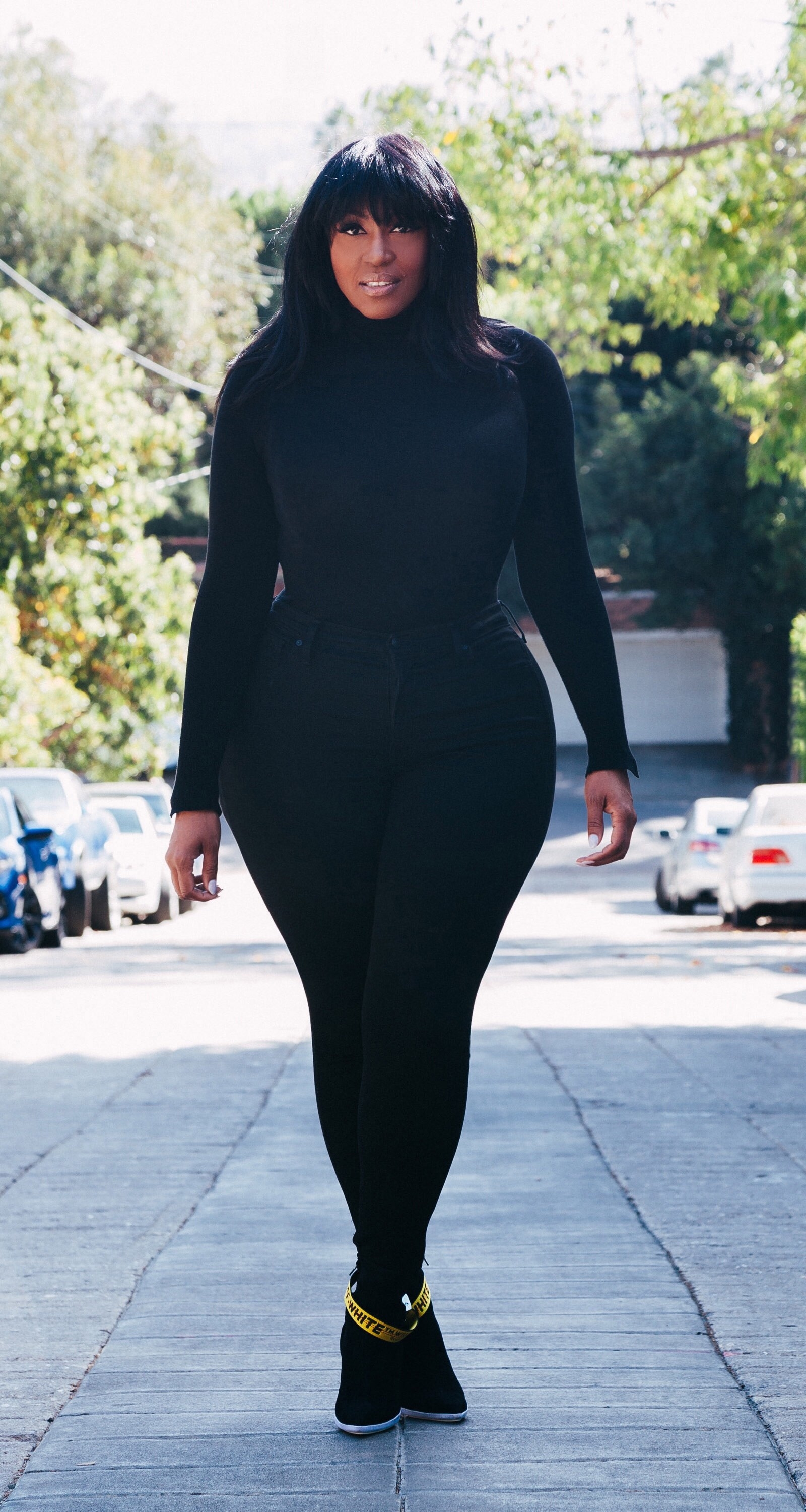
Have you ever felt pressure to maintain a certain physical image as a black woman in media? Has anyone ever suggested that you alter anything about your look to be more successful or to blend in better?
JW: I'm 5 feet 9 inches, and even if I got down to 130 pounds I promise 80% of it would be in my butt and my boobs. That is how my body is made. This is how my mother is made. That is how my aunts are made. But when I tell you, there's nothing more pulverizing in my life than my body. It's present, and people are aware of it. And I say this knowing the risk of backlash behind it, but it is the truth: Nobody body-shames me more than thin white women who are used to being the standard of beauty. Because I am an affront to their entire belief system. Because everything that they've been told qualifies you as being beautiful, I am the exact opposite of it.
And I don't want to make this specific to white women, because that's a sweeping statement that I don't think is fair. I've had amazing white women [in my life] who have been really affirming. I think … the problem is that women in general are so torn down every chance people get to tell us who we should be, what we should look like. These are the standards of beauty. Because think about it: A truly empowered person would only empower somebody else. So for someone to shame someone else, it is because there's something in them that they don't feel good about, that they then want to make you feel "less than" about. I'm a confident person, which intimidates a lot of people. And it's not meant to intimidate. It's just simply I know where I've come from, and I know what I've been through, and I know how hard I've had to work to get here. And so I also know where my power comes from. I know who I belong to. I know who's got me.
KBB: I remember when I first started, an editor told me not to wear my nice stuff to work, like, don't wear your designer clothes to work, because people are going to start to think that you come from money, and people are going to be following your pockets wondering how you can afford this and how you can afford that, so when it's time for a raise or it's time for a promotion, they're not going to give it to you. Basically: "Tone it down, you're doing the most." And I'm honestly the most, and I'm always going to do the most.
I can't tell you the number of interns I've had or who I've talked to who are working in the magazine industry and have natural hair, and asked me whether I think that they need to put a weave in their hair, or straighten their hair to fit in, and I always say "No! Absolutely not!" If I'm doing anything that's not myself, I'm doing a disservice to myself, because I think what I bring is my personality, my sense of style — my uniqueness is what makes me. And I am hoping that's why a company would want me on staff. If you can't be you, you don't need to work for that company. Point blank period.
SF: Actually, I’ve been encouraged in ways that corporate culture might abhor. Individual style is encouraged in fashion, so I haven’t been given pushback for having natural hair, even as an intern. Looking back I’m surprised I felt so confident walking into Condé Nast with a curly ‘fro nearly a decade ago.
What's your advice to black girls aspiring to do what you do? What do you wish you'd known?
JW: I'm a nerd. I'm socially awkward. I don't like parties. I ask really weird questions. I make really off-color jokes. But of all of those things, I'm so super incredibly sensitive. And all of those things growing up made me very different from everyone else around me. So I was taught that those things were wrong, and I spent so many years trying to be someone that I wasn't. And that ultimately is what led to me fucking up that whole Eriq situation because I had no idea who I was, and I was trying to be someone other than who I was. And it wasn't until I realized that every time that I actually won, it was because of those things that were unique to me, those things that I had been told previously were wrong. So if I could save anyone the time and the heartache, lean into the things about yourself that people shame you for. And I wish had learned that sooner, but now that I know it, I'm firmly committed to it. I would tell anyone, not just girls. Boys and everyone, be who you are.
KBB: For all the girls that I know who are at my level in the industry, we all started from the bottom, you know? I always say respect the process. If you want to do this, make that sacrifice. I had to make the sacrifice. I had a bachelor's degree when I started interning. Literally, I started the day after I graduated from Howard, and I was walking to an internship, not a job. And of course, after my mom spent all this money on college, she wants me to walk into a job. But it was like, "No, I have to get my foot in the door." Yes, I was making a $15-a-day stipend, but I was doing something that was setting me up for the career of my dreams. Once you get in there, you have to make an impression. Go above and beyond what's expected of you. Work that much harder. I think you'll see that your hard work will pay off. And it will happen pretty quickly.
Also, I would say lift each other up. You're sisters, you have to celebrate each other, help each other. The way I have a responsibility to kind of break down barriers for the next generation, the next generation is going to have that same responsibility for the generation behind them, and we're going to be stronger together.

SF: Anyone can be your mentor whether they volunteer it formally or you inject yourself into their life. Don’t limit yourself just to people who look like you, and don’t assume that someone ignoring you or communicating clearly that they can’t help you is because of negligence or not caring about your success.
I hope that everyone feels the pull to help the next generation and to make it easier for them, but also we need to be acutely aware of our own ascent. We can’t forget to take advantage of resources that raise us up, because if you’re conscious about it, you will help the successors. It’s not selfish; it’s inspirational and necessary for us to maintain and create status.
CORRECTION
There were three black women on staff at InStyle when Kahlana started. An earlier version of this feature read that there were two.
